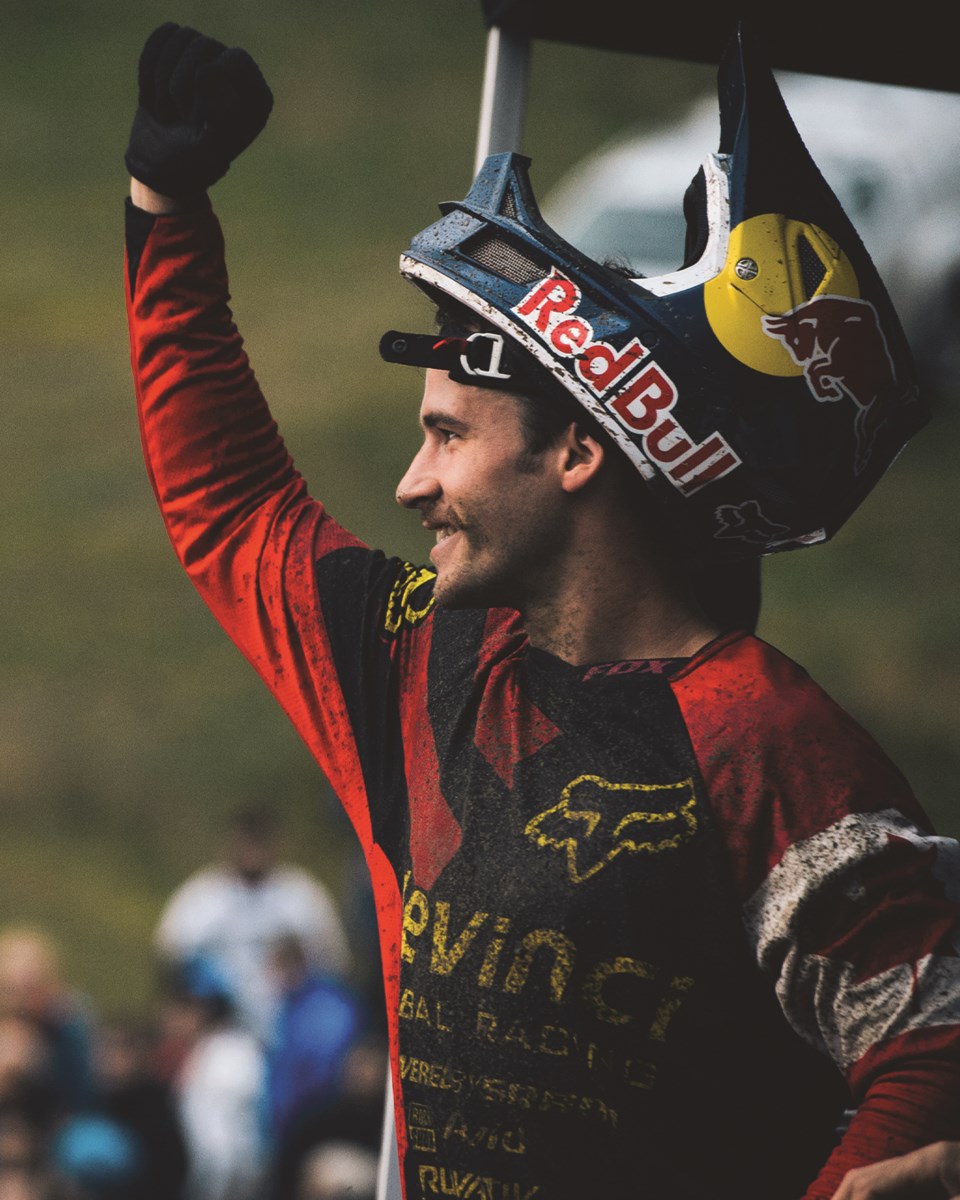The maniacal, win-at-all-costs competitor is so deeply ingrained in sports mythology that it’s essentially become a trope unto itself. By now, we’ve all heard the stories of the Kobe Bryants and the Tom Bradys and the John McEnroes of the sports world, whose single-minded pursuit of success often meant they weren’t all that easy to be around. Then there are athletes like downhill legend Stevie “Chainsaw” Smith who prove the exception to the rule.
“He’s one of those riders that everyone you talk to in the bike industry, everyone likes Stevie. One thing that a lot of riders have to say was how interesting it was how he balanced being super driven and competitive with being one of the most likeable guys on the circuit,” says Anthill Films’ Darcy Wittenburg.
Wittenburg is the director of Anthill and Red Bull Media’s new documentary, Long Live Chainsaw, about the life and legacy of a Canadian downhill icon. Wittenberg had known the Vancouver Island native since he was a teenager coming up to Whistler to train and ride, and featured a fresh-faced Smith in The Collective’s landmark 2008 doc, Seasons. It wasn’t long after the 26-year-old’s untimely death, in 2016, following a motorcycle accident that he realized Smith’s story was one that needed to be told on the big screen.
“The light bulb came on pretty quick for us,” recalls Wittenburg. “It was natural for us to start talking about the idea of making a film to tell his life story and really honour his legacy. For us, we just felt it was the best way we knew how to do a tribute for him. No one was ready right away being so close to him, so it took us a few years where we were at a point where we were ready to start filming.”
The result is a touching tribute to one of Canada’s most beloved riders, featuring interviews with friends, fellow athletes, and family, including a sit-down with Smith’s mom Tianna that tugs at the heartstrings.
“He grew up in Cassidy, just outside of Nanaimo, and he had a pretty humble upbringing being raised by a single mother,” Wittenburg says of Smith.
“I think his story also just shows the hardcore reality of what it’s like to be a single mother. She couldn’t be everywhere at once and it’s hard for a single parent to provide the financials for such an expensive sport … That’s where the community stepped in from a very early age for him, and a lot of people involved in the BMX race scene in Nanaimo really rallied around him and supported him.”
It’s not hard to see why Smith had so much support behind him. With his easygoing charm and infectious, gap-toothed smile, he was quick to gain fans wherever he went, and even as he evolved into the most successful Canadian mountain biker of all time, he never forgot where he came from, taking every chance he could to mentor young riders.
“His legacy was that he was really supportive of other racers in Canada, and after he passed away those really close to him started the Stevie Smith Legacy Foundation, which was formed just to do the things he did in the sport,” Wittenburg says.
Along with the foundation, which supports elite gravity racers achieve their dreams, Smith’s legacy lives on through the bike park bearing his name that opened in Nanaimo in 2017.
“There’s so much talent coming out of there now, and that’s because of Stevie,” Wittenburg says.
In spite of his laidback, approachable demeanour, Smith was of course no slouch behind the handlebars, a fearless rider whose balls-to-the-wall style was a thrill to watch.
“It’s almost a cliché to say that about pro athletes but he truly was always wanting more and just trying to ride as aggressively as possible,” Wittenburg says. “To be a world cup champion you have to find a way to take that raw speed and aggression and actually hone that so you can put it together in the race run. He really learned to become a highly polished athlete in the end.”
Smith’s unlikely 2013 UCI World Cup overall title win at Mont-Saint-Anne—the first and only Canadian to achieve that feat—provides the film with its nail-biting climax, a come-from-behind win that came down to the last run of the last race of the season.
“Stevie is the classic underdog who overcomes the odds,” Wittenburg says. “Stevie qualified first so that put him as the last racer to come down the mountains and it really came down to that one run. He had to win to win the overall title and being the last person to come down at the very end of the season, it’s the most amount of pressure you could possibly put on somebody. The fact that he actually came through is one of the most dramatic ends ever to a race season.”
The Maury Young Arts Centre will play host to two screenings of Long Live Chainsaw on Saturday, Nov. 20. The first all-ages screening gets underway at 6 p.m., with doors at 5:30, while the licenced, 19-plus screening starts at 9 p.m., with doors at 8:30. Tickets are $20 for adults and $12 for those under 16, available at showpass.com/long-live-chainsaw. All proceeds from the film will go to the Stevie Smith Legacy Foundation. Learn more at steviesmithlegacy.com.





